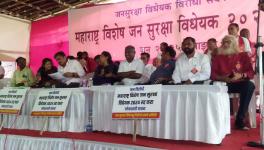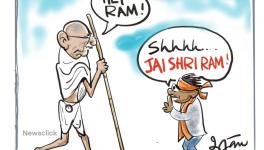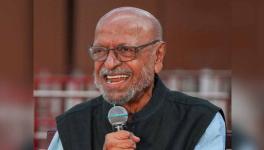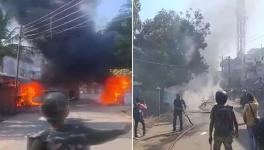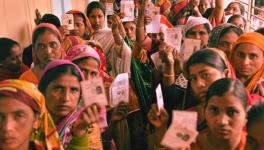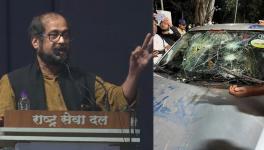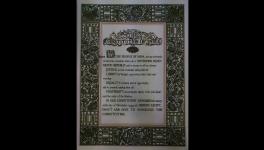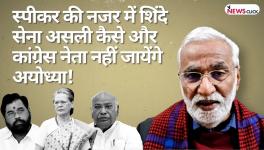Dilip Kumar, Bollywood Icon who Took on ‘Friend’ Thackeray
The street outside thespian Dilip Kumar’s well-appointed bungalow in Mumbai’s glamour district of Bandra-Pali Hill was packed with mourners and selfie-takers on 7 July as his mortal remains were taken to their final resting place. Called Nargis Dutt Street, it has seen angry political crowds and brainwashed fundamentalists baying for his blood in the past, that made his household restless, even scared, but he remained unflustered. Dilip Kumar or Mohammad Yusuf Khan, widely hailed as a one-man acting institution, could also be a fiercely secular Indian who called out fundamentalists, fascists and homophobes of his time when the occasion demanded it.
The 1990s were particularly demanding on this count. The decade opened with the Ram Janmabhoomi Yatra, winding its way across India, which led to Hindutvawadis demolishing the Babri Masjid. The vicious 1992-93 riots in Bombay after the demolition, ripped the largely cosmopolitan city apart. Dilip Kumar, with his good friend Sunil Dutt and others from the Hindi film industry, led relief campaigns and rapprochement meetings. They opened their homes and purses to the riot-affected. Dilip Kumar went a step ahead and spoke about the role of the Shiv Sena in the brutal January 1993 phase, unmindful of the long and mutually warm relationship he had shared with its founder, the late Bal Thackeray.
It brought a barrage of criticism in Thackeray’s reactions to news media and his editorial in the party newspaper, Saamna. Shiv Sainiks were raring to take on “Yusuf Khan” with their infamous muscle power. On cue, angry men protested outside the actor’s bungalow, raging up and down the street with their slogans and stones, targeting Sunil Dutt as well. Thackeray lived at the other, eastern, end of Bandra, only a few minutes from Dilip Kumar’s bungalow, but the fundamentalist fissure was so great that they rarely met with customary warmth thereafter.
The ‘Fire’ Between
Three or four years later, Thackeray’s men were protesting against Deepa Mehta’s “Fire”, a film about two rebellious lesbians played by Shabana Azmi and Nandita Das. Right-wing organisations called for its ban and protests erupted across India. Thackeray wrote a scathing editorial, a cue for his party men who vandalised cinema halls showing the film, tore down and torched its posters, and resorted to vulgar catcalls when lesbian scenes came on screen.
Thackeray, in addition to demanding a ban on the film, sarcastically added that he would allow it to run in Mumbai if the names of the two lead characters--Radha and Sita--were changed to Muslim names.
Deepa Mehta approached the Bombay High Court seeking police protection to exhibit her film. Her co-petitioner in the writ was the redoubtable Dilip Kumar. Others in Bollywood, including Javed Akhtar and Mahesh Bhatt, staunchly stood by Mehta, but Dilip Kumar had lent the gravitas of his persona to the writ petition itself. Thackeray saw red. Tens of his men landed outside his bungalow in a near-nude state, with smutty placards and lewd slogans, intending to embarrass him. His relief work during the riots, calling out his old friend, and being “Yusuf Khan” made him a special target.
The actor was unfazed. “They are acting out their roles as given by their director. Why should I worry if they are embarrassing themselves?” the thespian calmly asked this writer. Would he speak to his friend, Thackeray? Dilip Kumar shook his head in the negative, only once but firmly, a glaze of regret falling over his eyes. It could have been for the waning of a personal friendship or the fading of secular and tolerant society he knew. He then said, “Karmanye vadhikaraste ma phaleshu kadachana…” in that inimitable voice. The cadence, precision and pause in that recitation remain a fond memory.
Indian Icon, Pak Award
Worse was to come. In 1998, Dilip Kumar, the pre-Partition Peshawar-born man, was honoured with Pakistan’s highest civilian award, the Nishan-e-Imtiaz, even as India’s then Prime Minister Atal Bihari Vajpayee and Pakistan’s Nawaz Sharif attempted a breakthrough in the hostile bilateral relations. There was a kerfuffle over Dilip Kumar accepting the award. The buzz was that Dilip Kumar had consulted Vajpayee about it. After much consideration, he decided to accept it and took his good friend Sunil Dutt, whose roots also were in pre-Partition Pakistan, for the award ceremony.
A year later, the Kargil conflict ended any chance of a détente between the two nations and exacerbated hyper-nationalist sentiments on both sides of the border. Sections of the Indian media talked about Indian soldiers as “our boys” and so on. Bal Thackeray demanded that Dilip Kumar return the award or leave India forever. It was an unspoken test of nationalism, a faux test, but it caught the popular imagination. Thackeray’s men once again made their way to the street with obnoxious and hurtful slogans, demanding Dilip Kumar depart from India posthaste. Similar demands began to pour in from the hyper-nationalist right-wing elsewhere in the country.
This time, Dilip Kumar was hurt and anguished. The slur, “Go to Pakistan”, troubled him. He agonised over how it would be used increasingly against Muslims in India. “I chose to be in India,” he told this writer then, “It’s my land as much as yours, I will live here and I’ll be buried here. I will not live in the shadows or exit only because some demand it.”
Months later, he told Sunil Sethi on NDTV: “…it’s an abominable pronouncement by a responsible person, and has no legal validity. It’s hurtful, it offends one’s sense of personal dignity. One feels wronged and [it] makes you angry”.
During the troubled times, Dilip Kumar’s words carried weight on both sides of the border, as was evident years later in Khurshid Mahmud Kasuri, Pakistan’s former foreign minister’s book, “Neither A Hawk Nor A Dove”. Dilip Kumar, he disclosed, was one of the few enlisted to broker talks between Vajpayee and Sharif during the Kargil conflict. On his part, the actor did not preen about it or capitalise on it.
Political Citizen with a Voice
Dilip Kumar was not a politician and did not want to become one, unlike his dear friend Sunil Dutt, but he was a deeply-thinking political person. He had a one-on-one equation with Pandit Jawaharlal Nehru, campaigned for VK Krishna Menon in Lok Sabha election on Nehru’s word, actively associated with his friend Sharad Pawar’s campaigns till he could, also campaigned for Dr Manmohan Singh’s election from South Delhi in 1999, and shared a rapport with VP Singh as well as with Vajpayee and Thackeray.
In their relationship of nearly 50 years, Dilip Kumar did not hesitate to sometimes tell Pawar what he thought of his politics. Despite his earlier friendship with Thackeray—and relationship with Vajpayee—he did not hesitate to call them out for their fanaticism or fundamentalism. To live in Mumbai and take on Thackeray in the 1990s, or to be an Indian through that decade and later, called for a politically centred and courageous icon who could be more than an actor par excellence when the occasion arose.
Dilip Kumar, or Yusuf Khan as Thackeray sometimes mocked him, was all that and more, willing to leverage his icon status for social good. He knew the weight of his words, his voice, and was unafraid to use it in non-belligerent ways to push back fundamentalists. In a stroke of poetic justice, Thackeray’s son Uddhav, as chief minister of Maharashtra, conferred a state funeral for Dilip Kumar and travelled the Nargis Dutt Street into the bungalow to offer his condolences. The thespian must have chuckled to himself...
(The author, a senior Mumbai-based journalist and columnist, writes on politics, cities, media and gender. The views are personal.)
Get the latest reports & analysis with people's perspective on Protests, movements & deep analytical videos, discussions of the current affairs in your Telegram app. Subscribe to NewsClick's Telegram channel & get Real-Time updates on stories, as they get published on our website.










